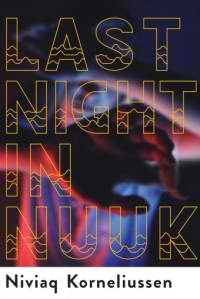Last Night in Nuuk by Niviaq Korneliussen
 Friday, April 19, 2019 at 7:38AM
Friday, April 19, 2019 at 7:38AM 
Published by Grove Press/Black Cat on January 15, 2019
Niviaq Korneliussen is blurbed as having created her own genre with Last Night in Nuuk, but I think she relocated Bright Lights, Big City to a small city in Greenland (Nuuk, the capital) and shifted the focus from one straight man who chases a woman to five young people who, while covering most of the sexual bases, chase each other. Like the protagonist in Bright Lights, Big City, the five central characters are young and wasted and self-absorbed. I suspect that readers who share those qualities will get more out of Last Night in Nuuk than I did.
A central character in Last Night in Nuuk views Greenland as a nation of anger, where alcoholism and wife beating and child neglect are tolerated while gay people are not. That character (Inuk, whose name means “man”) leaves Greenland to escape the anger, although he is among the angriest characters in the novel. Inuk also fled Greenland to avoid a burgeoning sex scandal. Greenland is part of the Kingdom of Denmark, but Inuk (who is presumably an Inuit) does not feel at home in Denmark, because he is not blonde and pale. Nor does he feel at home in Greenland, although it eventually becomes clear that Inuk is not at home with himself. Inuk’s life is revealed in a series of letters he sends from Denmark.
Inuk’s best friend is a sexually free woman named Arnuq (the longer version, Arnaluk, means “woman”) who fueled the scandal that forced Inuk to leave Greenland. Arnuq lives to party, leading to scenes of nightlife in Greenland, which like nightlife everywhere involves clubs, dancing, drinking, drugs, random hookups, and eventual vomiting. Arnuq’s problem with alcohol destroys not just her own life but the other lives she touches, primarily because she has no impulse control and can’t keep her mouth shut (and can’t stop her fingers from texting).
Inuk’s sister is Fia. Events in the novel complicate the relationships between Inuk, Arnuq, and Fia, including Fia’s realization that her fiancé Peter is boring her to death and that she is more attracted to women than men. She tests the theory that she might be a lesbian by having disappointing sex with a random ugly man, which might only prove that she’s not attracted to ugly men. She decides at that point to swear off sausage.
The fourth key character, Ivinnquaq (Ivik), has a girlfriend Sara, but Sara is kissing Fia while Arnuq is messing around with Ivik, who eventually reveals her own sexual identity issues. In any event, after Ivik explains how she came to realize her sexual preference for women, we also learn that Ivik no longer feels like having sex with Sara, or perhaps with anyone. She is needy when it comes to companionship and love but the opposite when it comes to sex. She fears abandonment but her loathing of sex invites Sara to abandon her. To the surprise of no reader by this point, Sara (key character five) turns out be angry and depressed. Welcome to Greenland.
It might be clear at this point that the characters in Last Night in Nuuk have a remarkable talent for creating drama in their lives (and I’ve only scratched the surface here). Many people have that talent, which makes them annoying to people who don’t share a desire for constant interpersonal conflict. Reading about their manufactured drama is also a bit annoying, at least to me.
Last Night in Nuuk is organized by character rather than chronology, so the reader needs to reassemble the pieces from time to time to make sense of the story. This is a character-driven novel, however, and the technique gives the reader a strong sense of the primary characters while inviting reinterpretation of events as seen from multiple perspectives.
I suspect that Last Night in Nuuk does what Korneliussen set out to do. The novel is well constructed and it plainly has literary merit. I try to be open to all forms of literature but I am likely not the novel’s target audience. Readers who know what to do with a hashtag might be more intuitively comfortable with the novel’s style and content (although I have to say that I enjoyed the style more than the content). I was more intrigued by the atmosphere and the critique of Greenland’s intolerance than I was by the characters and their endless drama.
While the story didn’t speak to me, neither did Bright Lights, Big City, another party-all-night-and-make-drama novel that received glowing reviews. The comparison leads me to recommend Last Night in Nuuk to Millennials, to readers for whom sexual identity is a burning issue, and to readers who enjoyed Bright Lights, Big City.
RECOMMENDED WITH RESERVATIONS